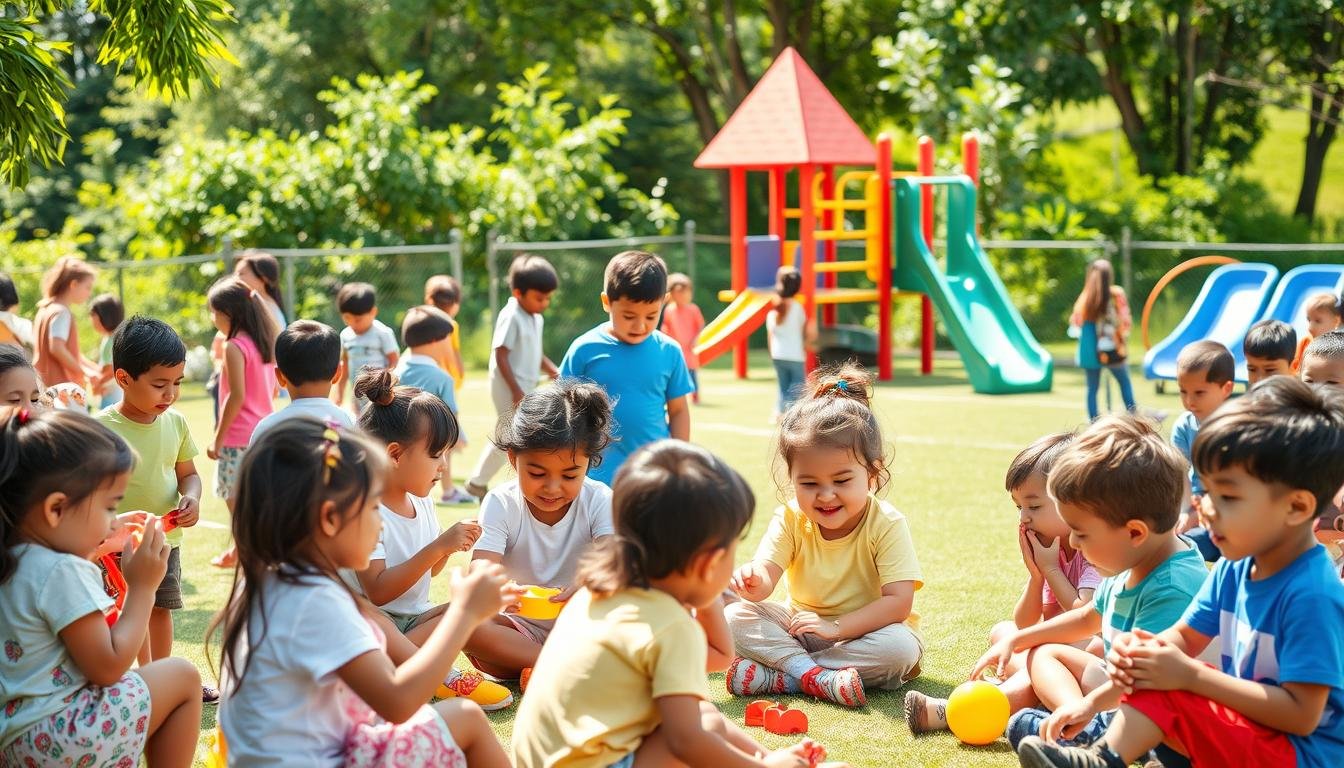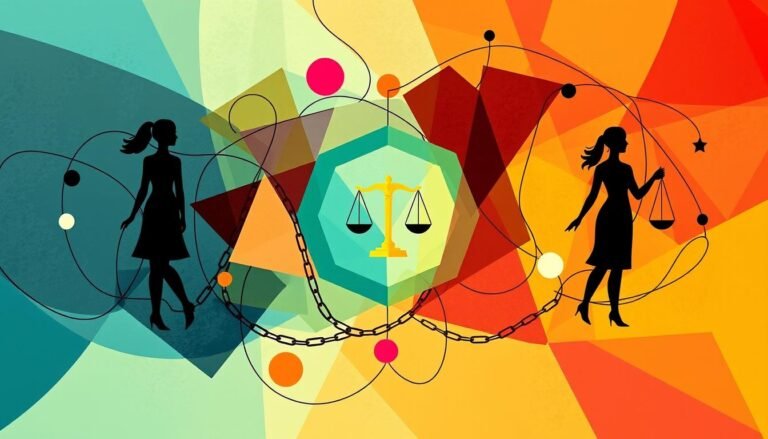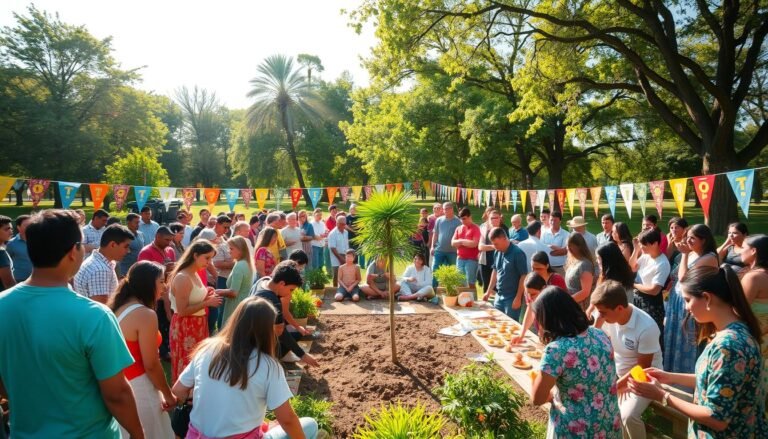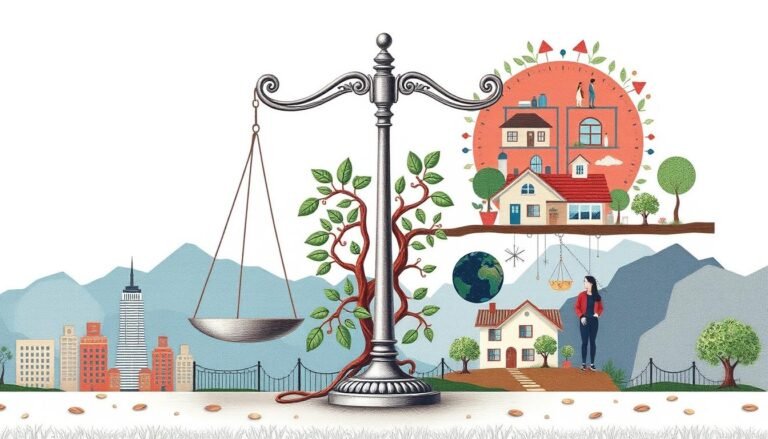Sociology of Childhood: Socialization and Development
Ever thought about how kids shape their own social worlds? The sociology of childhood reveals the complex ways kids grow and learn from others. It shows how kids interact, learn cultural norms, and have personal experiences that shape who they become.
Childhood is key to lifelong learning and growth. From birth, kids soak up information and learn how to fit into society. They’re not just passive learners; they also shape their world as they grow.
Childhood sociology looks at what shapes a child’s growth. Family, friends, school, and media all play big roles. By studying these, we learn how kids form their identities, develop social skills, and understand the world.
Recent studies highlight the wide range of childhood experiences worldwide. For instance, child poverty rates differ greatly in 25 countries, affecting kids in unique ways. Also, how kids see gender varies by culture, showing how society and identity mix.
Key Takeaways
- Children actively participate in their own socialization process
- Childhood experiences form the foundation for lifelong development
- Family, peers, schools, and media are key agents of socialization
- Cultural and socioeconomic factors significantly impact child development
- Gender construction varies across different cultures
- Childhood sociology examines the complex interplay of social factors in child growth
Introduction to Childhood Sociology
Childhood sociology looks at how young people join society. It shows how kids learn and create their social lives. Many things, like parenting and culture, affect a child’s growth.
Definition of childhood socialization
Childhood socialization is when kids learn about society’s norms and values. It starts at birth and goes on forever. Kids learn how to do things, what culture expects, how to talk, and how to interact with others.
Importance in social sciences
Studying childhood socialization is key in social sciences. It shows how early experiences affect our future actions. For instance, kids who don’t have much social interaction might struggle later on.
“Socialization is the foundation upon which we build our understanding of the world and our place in it.”
Key concepts and theories
Childhood sociology has important ideas. These include how friends, family, and school affect kids. Theories like functionalism and social constructionism explain how kids grow in their social settings.
| Concept | Description | Impact on Child Development |
|---|---|---|
| Primary Socialization | Occurs during childhood and adolescence | Shapes core values and beliefs |
| Secondary Socialization | Happens when encountering new social groups | Refines social skills and adaptability |
| Gender Socialization | Begins at infancy | Influences gender roles and expectations |
Historical Perspectives on Child Socialization
The study of how kids learn to be social has changed a lot over time. Early ideas saw kids as just taking in what adults taught them. This view made parents the main ones teaching kids about the world.
Now, we know that how kids learn from others affects both their own growth and how they fit into groups. It helps keep social classes and unfairness in place. The way this works can depend on the power and status of different groups.
In 2011, Woodhead pointed out that kids were being judged by certain standards more and more. This change shows how childhood and culture affect how kids learn to be social.
“The family serves as part of the ideological state apparatus contributing to the reproduction of inequality in capitalist society.” – Althusser
Functionalist thinkers say the family helps kids learn about social order. They think if kids don’t get this right, it can make it hard for society to stick together. Talcott Parsons saw the family and schools as key in teaching kids the norms and values of society.
| Perspective | View on Family’s Role |
|---|---|
| Functionalist | Teaches social order |
| Marxist | Performs ideological function |
| Parsons | Bridge for socialization |
As research went on, we saw kids play a bigger part in their own learning. This led to new views on socialization that show how both parents and kids influence each other. This has changed how we see kids’ experiences and learning today.
Theoretical Frameworks in Childhood Sociology
Childhood sociology looks at how kids grow and interact in society. It uses different theories to grasp socialization and identity formation. Let’s dive into three main views that shape our knowledge of childhood.
Functionalist Approach
The functionalist view sees socialization as key to keeping society stable. It shows how kids learn to fit into society’s norms and values. For instance, a 1949 study by George Murdock found the nuclear family is common in teaching kids future values.
Symbolic Interactionism
Symbolic interactionism looks at how kids build their sense of self through social interactions. It studies how kids make sense of symbols and meanings around them. This view sees socialization as a two-way process where kids help shape their own identities.
Social Constructionism
Social constructionism looks at how society and culture shape childhood. It questions the idea of a single, universal childhood. For example, a 2011 study by Woodhead showed how kids are judged by age-based skills, showing changes in society’s views.
These views give us different ways to see childhood socialization. By looking at various perspectives, we get a deeper understanding of how kids live in their social worlds and build their identities.
Primary Agents of Socialization
Childhood socialization shapes who we become as adults. Family, peers, and schools play key roles in this process. They help shape our values, behaviors, and views of the world.
Family Influence
Families are the first and most important in shaping us. Parenting styles vary a lot around the world. In Sweden, for example, 90% of dads take paternity leave for seven weeks after a baby is born. This shows a society that values shared parenting.
In the U.S., parenting depends on how much money a family has. Richer parents often push for creativity and making good choices. Poorer families might focus more on following rules and behaving well.
Peer Relationships
As kids get older, friends become more important. Friends help shape who we are and teach us about our culture. Even though teens value their friends a lot, parents still have a big impact.
Friends can either support or question the values our families teach us. This is key in learning social skills.
Educational Institutions
Schools are big in shaping us too. Kids in the U.S. spend about seven hours a day in school for 180 days a year. Schools teach more than just reading and math.
They also teach us what society expects of us through a ‘hidden curriculum.’ Schools prepare students for their culture, whether it’s in the U.S. or somewhere else. Public and private schools can teach different values, showing us the variety of social norms.
“Education is not preparation for life; education is life itself.” – John Dewey
Knowing about these main ways we’re shaped helps us see how kids become part of society. It shows how family, friends, and school work together to mold young minds.
Sociology of Childhood: Socialization and Development
Childhood is all about learning and growing socially. Sociologists study how kids experience the world and help shape their own growth. They find that kids don’t just soak up social lessons. Instead, they play a big part in building their own identities.
Research from around the globe shows how kids make sense of the world. A 2002 study looked at how kids see gender differently in various cultures. It shows how kids and society work together to shape their experiences.
Socialization does more than help kids grow. A 1990 study talked about how kids form their own social groups. It shows how friends are key to a child’s development.
“Children are not just passive recipients of culture, but active participants in creating and negotiating their social worlds.”
Kids go through different social experiences in different places. Studies in Italy looked at how preschoolers adapt to school. They found out how schools affect kids’ social lives.
| Aspect of Socialization | Key Findings |
|---|---|
| Peer Culture | Children actively create and negotiate social norms |
| Gender Construction | Varies across cultures, influenced by social context |
| School Transition | Significant impact on peer relationships and identity formation |
These studies show that childhood is a time of constant learning and growth. Kids mix their own choices with what they learn from others. This mix shapes who they become and how they develop.
Cultural Influences on Child Socialization
Child socialization processes differ across cultures, making childhood experiences unique. Cultural influences greatly shape how children develop and interact with their world.
Cross-cultural Variations
Studies highlight big differences in how parents raise children around the globe. In East Asia, young kids are more likely to share and help out than kids in the West. Chinese moms teach their kids to follow social norms, encouraging them to help others for the right reasons.
Impact of Globalization
Globalization has made cultures mix more, changing how kids grow up. A study found that third-generation Mexican American kids are more competitive than their second-generation peers. This shows how cultural values can change over time.
Media and Technology Effects
Today, media and technology play a big role in how kids socialize. These tools expose kids to many cultures and new ways to connect with others. The effect depends on the culture, with kids from individualistic cultures telling stories about themselves online. Kids from collectivist cultures share stories about others.
| Cultural Aspect | Individualistic Cultures | Collectivist Cultures |
|---|---|---|
| Self-description | Based on unique attributes | Based on relationships with others |
| Discipline methods | Taking away personal belongings | Emphasizing impact on others |
| Communication style | Long, self-focused stories | Brief, other-oriented stories |
It’s important for parents, teachers, and leaders to understand these cultural influences. This helps support healthy growth in kids from different backgrounds.
Identity Formation in Childhood
Childhood is a key time for forming one’s identity and developing social skills. Kids learn about who they are by interacting with family, friends, and the world around them. They try out different roles, values, and beliefs, shaped by things like gender, ethnicity, and social class.
Social identity is crucial for how kids see themselves and feel about themselves. It affects how they act with others and see their place in groups. Being part of a group helps kids behave kindly, feel like they belong, and get the respect they want from others.
Studies show that how kids are socialized can affect their risk of feeling depressed. Kids with few social identities might be more at risk if they face loss or threats to their roles. Signs of social issues or depression in kids include losing interest in activities, eating or sleeping differently, and having trouble focusing.
“The quest for identity in adolescence is a dynamic process that varies across individuals and over time.”
Recent studies have looked into how the brain handles social self-evaluations in teens. They found changes linked to age and puberty. These findings show how biology and social factors work together in shaping a child’s identity.
| Aspect of Identity Formation | Key Findings |
|---|---|
| Daily Dynamics | Variability in identity formation and mood across adolescence |
| Longitudinal Changes | Patterns of stability and change in identity development over time |
| Sociocultural Influences | Impact of cultural context on self-construction and identity |
Social Inequalities and Child Development
Social inequalities deeply affect how children grow and interact with others. Studies show kids notice differences in resources early on. This shapes their social skills and how they see themselves.
Socioeconomic Factors
By kindergarten, kids start to group others by what they think they own. This early insight changes how they make friends and do in school. Kids from poorer homes are often three times more likely to not have enough food. This hurts their growth and thinking skills.
Gender Disparities
Gender also plays a part in how kids experience the world. Girls are more likely to be bullied emotionally at school. Boys might face other social challenges. These differences can shape who they become and what they dream of.
Racial and Ethnic Influences
Race and ethnicity greatly affect how kids learn to socialize. Kids and teens link higher income with certain races. This can make them feel biased inside and hurt their self-worth. Also, kids from racial minorities often struggle to get good healthcare. This leads to health issues later on.
It’s key to understand these social inequalities to fix them in child development. By seeing these issues, we can make places where all kids can do well.
Childhood Agency and Socialization
Recent studies have shown that children are not just passive in their social growth. The 2015 Grusec and Hastings handbook talks about how kids shape their own development from early on. They are not just taking in social norms; they are actively involved in their growth.
Family has a big impact on how children develop. The 2019 Bornstein Handbook of Parenting explains how parents affect kids’ self-control, right and wrong, and how well they do in school. But it’s not just one way. The 2003 Kuczynski Handbook shows that kids also play a big part in how they interact with their parents.
Schools and friends also shape who kids become. Ferguson’s 2000 study looked at how public schools affect black boys. Corsaro’s 1994 study compared how kids in US and Italian nursery schools interact with each other. The Morris and Smith 2023 Cambridge Handbook of Parenting talks about how things like culture and policies affect how kids grow and socialize.
Source Links
- Development and Socialization in Childhood
- No title found
- Chapter 5. Socialization
- Childhood Socialization
- Sociological Perspectives on Socialization – Sociology – Oxford Bibliographies
- Sociological Perspectives of Childhood | Vaia
- Chapter 5. Socialization
- Socialization and Childhood in Sociological Theorizing
- Sociological Perspectives of Childhood | StudySmarter
- Agents of Socialization | Introduction to Sociology
- Agents of Socialization: Definition & Examples
- Agents of Socialization
- Culture and Social Development | Encyclopedia on Early Childhood Development
- Cultural Influences on Child Development
- How Kids View Themselves Can Contribute to Depression Vulnerability
- The Development of Self and Identity in Adolescence: Neural Evidence and Implications for a Value-Based Choice Perspective on Motivated Behavior
- A Developmental Science Perspective on Social Inequality
- Sociology: Societal Structure, Development of Childhood, and the Well-Being of Children
- Understanding Childhood in Sociology







